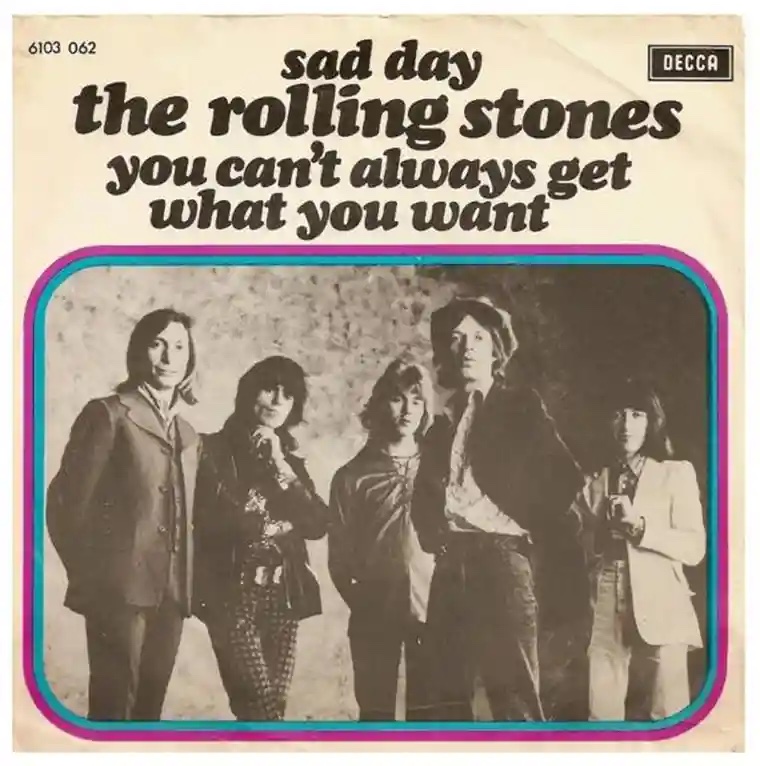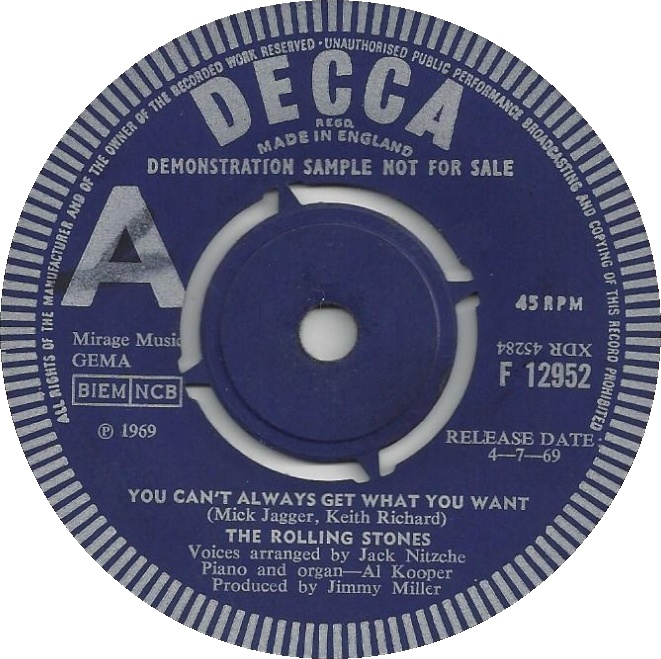Al Kooper on Recording “You Can’t Always Get What You Want” With the Stones
by Harvey Kubernik American musician Al Kooper is known for several high-profile career accomplishments, including co-founding Blood, Sweat and Tears; playing organ on Dylan’s “Like a Rolling Stone” and discovering and producing Lynyrd Skynyrd. But he was also a first-call studio session man for years, appearing on recordings by the Who, Jimi Hendrix, George Harrison and many others. In 1968, he was asked to help out on a few recordings the Rolling Stones were working on, including the classic “You Can’t Always Get What You Want.” We asked him what that experience was like. Here is his account of how it all went down…
American musician Al Kooper is known for several high-profile career accomplishments, including co-founding Blood, Sweat and Tears; playing organ on Dylan’s “Like a Rolling Stone” and discovering and producing Lynyrd Skynyrd. But he was also a first-call studio session man for years, appearing on recordings by the Who, Jimi Hendrix, George Harrison and many others. In 1968, he was asked to help out on a few recordings the Rolling Stones were working on, including the classic “You Can’t Always Get What You Want.” We asked him what that experience was like. Here is his account of how it all went down…
“I saw the American debut of the Rolling Stones in June of 1964 at Carnegie Hall. It was hard to hear them because of the f**kin’ women going berserk. Different from the Beatles. And I caught them on The Ed Sullivan Show. I later knew Brian Jones from the June 1967 Monterey International Pop Festival, where I was the assistant stage manager. [Editor’s note: Jones did not perform but attended as an audience member.]
“After I completed [the album] The Live Adventures of Mike Bloomfield & Al Kooper, I went to London and I was picked up at the airport by my good friend [producer] Denny Cordell. He then said, ‘The Stones’ office called me and asked if [Kooper] felt like playing on a few recording sessions with them. They want you to play on some sessions.’
“I said, ‘How did they know I was gonna be in England?’ and Denny replied, ‘I didn’t say a f**kin’ word. And I don’t even know how they figured out I was involved.’ But they called me for Tuesday and Wednesday night at Olympic Studios.’
“The next day, we left the hotel and went shopping on Kings Road and ran into Brian Jones in a shirt store, who asked, ‘Are you gonna play the session, Al?’ I could never say no to these people, so I went. The main reason they wanted me was that Nicky Hopkins, their regular keyboardist, was in the United States.
“I went to the studio. Bill [Wyman] and Charlie [Watts] were there. I had met them before with Bob Dylan. I sat at the organ and met Jimmy Miller, the producer. Mick [Jagger] and Keith [Richards] bolted through the door. Mick wore a gorilla coat and Keith a hat with a long feather. Everyone sat around and they passed out acoustic guitars to anyone who could play acoustic guitar. Then they ran down the tune for everybody with the chord changes and the rhythm accents. There was a conga player in the room who rolled hash joints. It was decided that I would play piano on the basic track and later do an organ overdub.
“I got a groove going, which I heard on an Etta James cover version of ‘I Got You Babe’ that worked. It had nothing to do with Sonny and Cher. I could not believe the Etta version. I heard it on the radio and thought it was unbelievable. I wanted to own it and bought it. They played the song in the studio to learn.
Watch Kooper cover “You Can’t Always Get What You Want” in 2014
“Keith picked up on it with a guitar part that meshed with my organ part. Jimmy Miller showed Charlie an accent and he just couldn’t get the part. Jimmy sat down at the drums and stayed there and played on the take. Charlie was unhappy but he hid it completely. Very graceful. He didn’t throw a temper tantrum but said, ‘Why don’t you just play the drums?’ He said it sincerely. He didn’t say it like I would have. (laughs). Bill played bass, I played piano. Mick and Keith played acoustic guitars. Keith then did a lead electric guitar part and I overdubbed the Hammond organ. We were out there together. Brian Jones was in the corner on the floor reading a magazine.
“The recording went on for about four hours. Then all sorts of food arrived later in the night: Racks of lamb, salads, wines. Not a cheeseburger break like back in the States.
“I told Mick that if he ever wanted to have horns on the record to call me. Over a half a year later an eight-track master tape showed up at my office at CBS Records. The note said, ‘Dear Al, you once mentioned you could put some great horn parts on this. Well, go ahead and do it and send us the tape back. Love, Mick.’
 “They were working on an album, and the record had an intro on it that we didn’t do. That was a separate piece that they tacked on to the front. I wrote a horn chart and hired a horn section and left a spot in the intro for a French horn solo. I was coached by Ray Alonge. I sent the tape back to Mick. Around a year later it came out without all the horn parts except the French horn at the intro. I think they really liked what I did and gave me credit. But I failed at what I set out to do, which was putting horns on it like the Etta James record. I thought it was really great and I was able to play, what I think, is some of my best playing I ever did in retrospect. [“You Can’t Always Get What You Want” was released as a single on July 4, 1969.”]
“They were working on an album, and the record had an intro on it that we didn’t do. That was a separate piece that they tacked on to the front. I wrote a horn chart and hired a horn section and left a spot in the intro for a French horn solo. I was coached by Ray Alonge. I sent the tape back to Mick. Around a year later it came out without all the horn parts except the French horn at the intro. I think they really liked what I did and gave me credit. But I failed at what I set out to do, which was putting horns on it like the Etta James record. I thought it was really great and I was able to play, what I think, is some of my best playing I ever did in retrospect. [“You Can’t Always Get What You Want” was released as a single on July 4, 1969.”]
Related: Our Album Rewind of the Stones’ Let it Bleed
“The next night Mick and Keith picked me up at the hotel, they were in the lobby, and we cut a track [“Memo from Turner”] for Performance, the film Jagger was working on. It’s not the version in the movie or soundtrack. I played guitar.”
Bonus Video: Watch the Stones perform “You Can’t Always Get What You Want” in their film The Rolling Stones Rock ‘n’ Roll Circus
Al Kooper was inducted into the Rock & Roll Hall of Fame in 2023 in the Musical Excellence category. His memoir, Backstage Passes & Backstabbing Bastards, is available here and here.
[Author and music journalist Harvey Kubernik’s books are available here and here.]







8 Comments so far
Jump into a conversationJust finished Harvey’s book, “Turn Up the Radio”. Some of the stories you know. But there is a lot of priceless LA music history inside a wonderfully illustrated book. Loved the front piece about Ray Manzarek and basketball.
Is there anyone in rock history that has more wildly divergent stories about his role than Brian Jones? For so long we heard nothing but how Jones was the behind-the-scenes puppet master of the Stones, responsible for all manner of sounds on their records outside of the basic “combo” sound. We’ve heard that it was Jones who came up with many of the classic guitar parts on their early hits and recordings. Yet, then there’s stories like this that paint him as the disinterested party who enjoyed the rock star life, but didn’t seem much interested in the actual making of the music. The celebrity who encouraged Al Kooper to come to the recording session, but then didn’t take part in the session himself. Stories like these are common from this later “early” period, as Jones is said to have been too stoned to play on “Sympathy For The Devil,” and well as just about all of the “Let It Bleed” LP. As for his rep as the originator of many of their famous early riffs, when you see videos of the Stones actually playing live, Jones basically looks like he’s posing with his guitar live, and doesn’t have the look (to the eyes of this veteran guitar player) of someone who is very intimately acquainted with his instrument. This is not actually surprising considering the Stones had reputedly just learned to play their guitars shortly before they actually became a band. Which once again brings up the question I’ve asked many times on these pages: Who is actually playing all those precision guitar parts on the early Stones hits?
Well. I think, from a psychological point of view, Brian was getting resentful towards Mick n Kieth. He’s like F them, getting together, writing the songs, then of course he loved to be in the show. It all just got so unbearable for all concerned. I watched it going down as a fan of the music. Their instrument playing go much better over time, but poor Brian had to watch the 2 most attractive dudes in the Stones take it all away. He was very bummed out.
I don’t think we can give much credence to the notion they only just learned the guitar.
They had been a cover band for an awful lot of gigs before they even started writing their own stuff.
Who is playing the precision guitar parts on the early records? Keith Richards and Brian Jones. You seem to have formed some opinions of their musicianship based on some very superficial observations. I’ve never once heard anyone question who played guitar on Stones records, including the many people who actually were at the sessions.
I have been a huge Al Kooper fan since the days of the Blues Project, B.S&T. first album and through his solo career. But if he produced the first three Lynyrd Skynyrd albums, he certainly did not discover the band. Jimmy Johnson from Muscle Shoals Sound Studio did and the band always acknowledged what he did for them.
Kooper is amazing, not only his work with others but his solo stuff as well.
If only someone would release the treasure trove of unreleased material he has
An excerpt from Al’s book – which is one of my favorite rock bios – makes mention of Al’s approximately 100 takes before he found a keeper for that French horn solo, because, you know, he wasn’t a horn player. Thus the lessons. But that’s what the Stones kept!